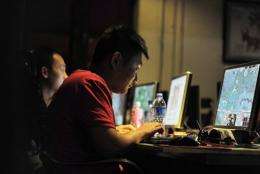China cracks down on 'fake journalists and news'

China said Monday it had launched a campaign to crack down on "fake journalists and news" and "illegal media outlets", as it further tightens its grip on the media in the Internet era.
The move is the latest in a slew of measures introduced by Beijing in recent weeks aimed at controlling the circulation of information and the fast-growing Internet, which now has more than half a billion users in the country.
The General Administration of Press and Publication (GAPP) -- China's publishing body -- said in a statement that "fake newspapers and periodicals, media outlets, journalists and news" had repeatedly emerged in the country.
This has "severely disturbed the press and publication order and affected social harmony and stability," GAPP said, adding it had launched a nationwide crackdown that would last until the end of the year.
Targets include unfounded news reports and "fake" journalists -- such as website employees reporting without proper media credentials, it said.
GAPP has also ordered media organisations to tighten their censorship of news sources and content to "resolutely prevent the emergence of fake news".
The Chinese government operates a large censorship system in traditional media and on the Internet that blocks information it deems sensitive, and the growing popularity of social networking sites has alarmed Beijing.
Authorities have blamed many bouts of unrest on rumours generated online, which were then reported by traditional media.
In September, for instance, hundreds of protesters attacked a police station in southern China and ransacked vehicles, leaving dozens injured in an incident partly blamed on rumours that police officers had killed a child.
That same month, the head of Internet giant Sina said the company, the owner of China's most popular Twitter-like microblogging service, had set up "rumour-curbing teams", apparently in response to government pressure.
The government also said in October that police had begun to detain and punish people for spreading rumours online.
And at a secretive annual meeting in Beijing last month, the country's Communist Party chiefs agreed on directives that included stricter control of social networking sites and a crackdown on "vulgar" material on the web.
(c) 2011 AFP





















